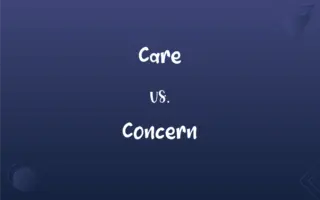Cognition vs. Metacognition: What's the Difference?
Edited by Aimie Carlson || By Janet White || Published on January 25, 2024
Cognition involves mental processes like thinking and learning, while metacognition is the awareness and regulation of these cognitive processes.

Key Differences
Cognition refers to the mental activities involved in acquiring knowledge and understanding through thought, experience, and the senses. Metacognition, on the other hand, involves thinking about one's own thinking processes, including planning, monitoring, and assessing one’s understanding and performance.
Cognition encompasses a wide range of mental processes such as memory, attention, language understanding, problem-solving, and decision-making. Metacognition focuses on the self-awareness and control over these cognitive processes, enabling individuals to regulate and optimize their learning and problem-solving strategies.
In the realm of education and learning, cognition is the primary target of most teaching methods, aiming to enhance knowledge acquisition and skill development. Metacognition, however, plays a crucial role in how learners understand their own learning process, adapt strategies, and become more effective at self-regulation and self-directed learning.
Everyday cognitive tasks include remembering appointments, understanding conversations, and making decisions. Metacognitive abilities enable individuals to evaluate their own understanding, recognize when they need more information, and adjust their strategies accordingly.
When faced with a problem, cognition involves identifying, analyzing, and solving the problem. Metacognition steps in to monitor this problem-solving process, evaluate its effectiveness, and make adjustments if needed to improve the outcome.
ADVERTISEMENT
Comparison Chart
Definition
Mental process of acquiring knowledge
Awareness and control of cognition
Functions
Thinking, learning, memory, perception
Planning, monitoring, evaluating
Role in Learning
Acquiring skills and knowledge
Regulating and optimizing learning
Application
Everyday tasks and decision-making
Self-assessment and strategy adjustment
Developmental Focus
Enhancing mental processes
Developing self-awareness and control
ADVERTISEMENT
Cognition and Metacognition Definitions
Cognition
The mental action of acquiring knowledge and understanding.
Her quick cognition of complex concepts impressed her teachers.
Metacognition
The ability to analyze and control one's learning strategies.
Effective metacognition leads to better problem-solving skills.
Cognition
The capacity for processing information and understanding.
Children's cognition develops rapidly in the early years.
Metacognition
Self-regulation over cognitive processes in learning.
Metacognition improves his ability to plan his study schedule.
Cognition
The processes of thinking, reasoning, and problem-solving.
Effective cognition is crucial for critical thinking.
Metacognition
Awareness and understanding of one's own thought processes.
Her metacognition helps her recognize when she needs to study more.
Cognition
The intellectual function of discerning and judging.
Good cognition is essential for making sound decisions.
Metacognition
Reflection on and evaluation of one’s own thinking.
Metacognition involves questioning one's own understanding.
Cognition
Mental activities associated with learning and memory.
His sharp cognition aids him in memorizing detailed information.
Metacognition
The process of thinking about and managing cognition.
Through metacognition, she adapts her approach to complex tasks.
Cognition
The mental process of knowing, including aspects such as awareness, perception, reasoning, and judgment.
Metacognition
(philosophy) the act of thinking about thinking; sentience
Cognition
That which comes to be known, as through perception, reasoning, or intuition; knowledge.
Cognition
The process of knowing, of acquiring knowledge and understanding through thought and through the senses.
Cognition
(countable) A result of a cognitive process.
Cognition
The act of knowing; knowledge; perception.
I will not be myself nor have cognationOf what I feel: I am all patience.
Cognition
That which is known.
Cognition
The psychological result of perception and learning and reasoning
FAQs
Can cognition be improved?
Yes, through practices like learning, training, and brain exercises.
How does cognition affect learning?
It's central to processing information and acquiring skills.
What is metacognition?
Awareness and regulation of one's cognitive processes.
What is cognition?
Mental processes of acquiring knowledge and understanding.
Why is metacognition important in education?
It helps students regulate their learning and improve strategies.
What are examples of cognitive processes?
Memory, attention, problem-solving, and decision-making.
How does metacognition differ from cognition?
Metacognition involves self-awareness and control over cognitive processes.
Do cognition and metacognition work together?
Yes, they interact to enhance thinking and learning efficiency.
How does cognition affect decision-making?
It plays a key role in processing information and making judgments.
How does stress affect cognition?
It can impair cognitive functions like memory and concentration.
What role does cognition play in perception?
It helps interpret sensory information and form understandings.
What practices enhance metacognitive skills?
Activities like reflective journaling and strategy discussion.
Is metacognition a conscious process?
Yes, it involves conscious reflection and regulation of thinking.
How can metacognition be developed?
Through practices that encourage reflection and self-assessment.
Can metacognition affect academic performance?
Yes, it can significantly improve learning effectiveness.
Can technology assist in developing metacognition?
Yes, through tools that promote reflective learning and self-assessment.
Are there age-related changes in cognition?
Yes, cognitive abilities can change with age.
How does metacognition help in problem-solving?
By enabling individuals to evaluate and adjust their approach.
How can teachers foster metacognition in students?
By encouraging self-reflection and strategy evaluation.
Is cognitive decline inevitable with age?
Not necessarily; many can maintain cognitive health with proper care.
About Author
Written by
Janet WhiteJanet White has been an esteemed writer and blogger for Difference Wiki. Holding a Master's degree in Science and Medical Journalism from the prestigious Boston University, she has consistently demonstrated her expertise and passion for her field. When she's not immersed in her work, Janet relishes her time exercising, delving into a good book, and cherishing moments with friends and family.
Edited by
Aimie CarlsonAimie Carlson, holding a master's degree in English literature, is a fervent English language enthusiast. She lends her writing talents to Difference Wiki, a prominent website that specializes in comparisons, offering readers insightful analyses that both captivate and inform.































































